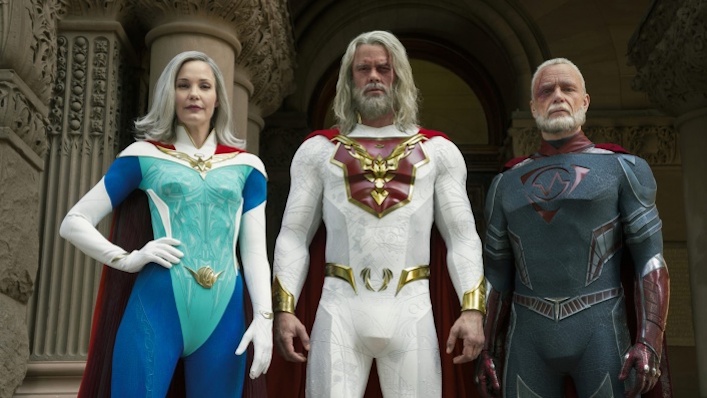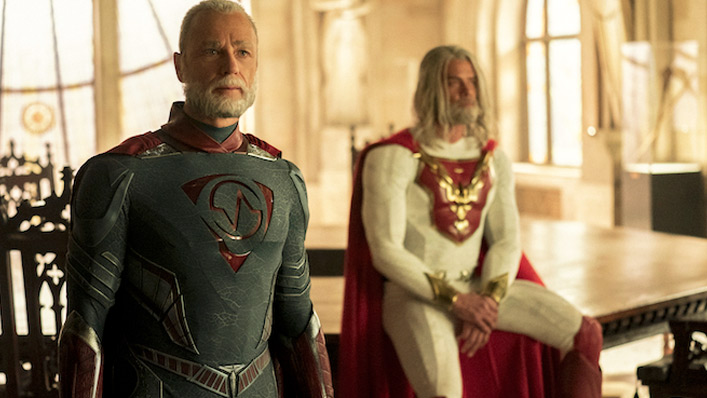Superhero series Jupiter’s Legacy leans on angst, forgets about story
Occasional moments of fun can’t save a poorly written superhero series.

There’s some fun to be had in Netflix‘s multi-generational superhero series, but nothing that makes the show more worthy than a gazillion other similar offerings available, writes critic Travis Johnson.
In 2017 Netflix ponied up a stack of cash for comic scribe Mark Millar’s creator-owned company Millarworld, with an eye to adapting his various books for the small screen. Now we’re seeing the result. Film fans are familiar with at least some of Millar’s titles: Kick-Ass, Kingsman: The Secret Service, and Wanted are all derived from his works, and he’s put words in the mouths of Superman, Captain America, Judge Dredd and more over the years. Eight-part series Jupiter’s Legacy marks a new phase in Millar’s career as a creator and Netflix as a production house—so it’s a bit worrying that the result is a bit, well, meh.
See also:
* The best movies on Netflix
* All new movies & shows on Netflix
Following in the footsteps of Watchmen, The Boys, Invincible, arguably the DC Extended Universe, and any number of other “gritty, psychologically complex” superhero texts, Jupiter’s Legacy posits a world where two generations of superheroes are coming into conflict. The old guard are Superman-analogue The Utopian—aka Sheldon Sampson (Josh Duhamel) and his team, The Union of Justice (an ersatz Justice League) whose origins lie in the 1930s that in our world saw the birth of the superhero genre.

In the present day, Sampson is worrying that his “truth and justice” morality—what he calls “The Code”—is no longer relevant in a complex and changing modern world. Much of his screen time is spent grappling with the possibility that, for all his power, he’s no longer fit for purpose. Duhamel is great in the part, rocking long grey hair and a beard that makes the old Superman Christ metaphor all the more explicit, sinking his teeth into the role of a fundamentally decent man struggling with his legacy and his place in the world.
His legacy is his children and their fellow young supers. Son Brandon (Andrew Horton) tries to take the same heroic path as his father under the name The Paragon, but breaks The Code when, in the heat of battle, he straight up kills supervillain Blackstar (Tyler Mane). More interesting is daughter Chloe (Elena Kampouris) who eschews the cape life for straight-up hedonism: clubs, drugs, one-night stands and tabloid covers. “What if Superman’s kid was Paris Hilton?” seems to be the thinking here.
Okay, but what’s it all about? I wish I could tell you.
That’s not because I’m shackled by embargoes or wary of spoilers, but because Jupiter’s Legacy goes to great lengths to set up thematic conflicts but does little to actualize them in nuts-and-bolts storytelling. I mean the really basic stuff: i.e. someone wants something, there are one or more obstacles between them and their goal, and we follow them as they attempt to overcome those obstacles. Real first-day-of-writing-class fundamentals.
Jupiter’s Legacy has none of that.
It sometimes appears as if it does, but the series never goes so far as to commit its characters to a course of action. The Utopian is worried that either his children have no use for his Code, or that his Code has no use anymore—but what does he want, and what’s stopping him from getting it? The Paragon aspires to live up to his father—but what’s stopping him from that? We know what Chloe doesn’t want, which is to be a superhero like her parents, so what’s driving her now?
We need to know these things, at least to some degree; they are the building blocks of conflict and drama. Instead, Jupiter’s Legacy spins its wheels, padding it its first eight episode season with a parallel storyline set in the 1930s that tracks the (largely irrelevant) origins of the Union, while in the modern day various characters drone at each other about… well, not much. Time-killing dialogue is still time-killing dialogue, even when the characters speaking it are in brightly coloured costumes (The Falcon and the Winter Soldier was guilty of this too).
There’s some fun to be had, mostly in the periphery. Some supporting characters are intriguing, like George Hutchence/Skyfox (Matt Lanter), who channels some of that Bruce Wayne/Tony Stark insouciant billionaire fun in the flashback sequences. And teleporter Hutch (Ian Quinlan), who leads a team of superpowered thieves in the modern age. Still, they’re not much compensation when what should be the main thrust of the story seems not only lacking, but absent.
These first eight episodes are all place-setting, arranging the pieces on the board for what will presumably be some kind of epic pay off. But Jupiter’s Legacy is relying on our knowledge of the superhero genre to make us expect that pay off; nothing in the series supports that anticipation. It’s all meta and no text. And at a time when we’re drowning in cape content, there’s nothing here that makes this show more worthy of your attention than any dozen similar offers currently available.






















